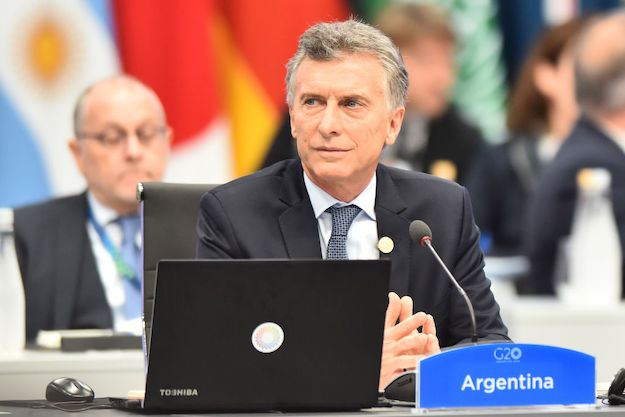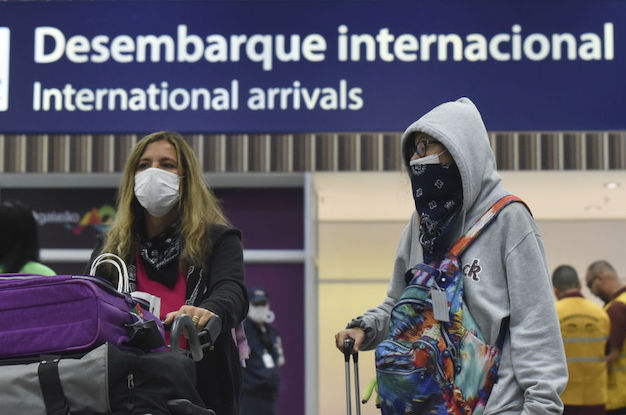Part of a continuing series on how Latin America can overcome a decade of slow economic growth.
Six presidential elections, one recession, meager growth, cheap oil – all with higher interest rates in the U.S. and global trade tensions making investors skittish about emerging markets. That’s what to expect for Latin America in the new year, said Mauro Leos, Associate Managing Director at Moody’s Investors Service. Leos spoke to AQ to offer his views on what will impact the region overall and in Chile, Colombia, Argentina, Brazil, Mexico and Peru specifically. The conversation has been edited for clarity and length.
Americas Quarterly: Since late 2018 there have been talks of a downturn in the U.S. economy, where markets plunged towards the end of the year. Looking at Latin America, what impact do you expect from external risks?
Mauro Leos: We see 2019 as a transition year. The relevance of the international context and particularly the U.S. economy will be more significant in 2020. Even if there is agreement with China, the most likely scenario is that trade tensions will continue. Trade tensions have an impact in terms of growth of course but what is more relevant is the financial market reaction to that. Investors, funds and bondholders become more reluctant or less willing to lend to emerging economies, and spreads are higher.
The question becomes to what extent countries and the region in general will be prepared to deal with a more complicated 2020, particularly in those cases where you have new governments.
AQ: What can we expect for regional credit ratings in 2019?
Leos: We have stable credit prospects in 2019. You have countries making a comeback like Chile, with improved business sentiment and confidence and now high growth prospects. You also have the case of Colombia, where the more market-friendly candidate was elected, although we have seen that President Iván Duque has had some problems pushing his economic tax program through Congress. Argentina had a crisis, but there was support from the IMF that provided some stability and the question now is what lies ahead. And last but not least, Brazil and Mexico.
AQ: Shall we look at the countries you mentioned? You say Chile is making a comeback. What is the engine for that?
Leos: In Chile, we see a strong correlation between investor sentiment and actual investment and therefore economic growth. We are seeing this across a broad spectrum of activities, but particularly when it comes to increased domestic consumption. Energy has been an important segment when it comes to new investments and the fact that the new administration is trying to adopt more investor-friendly regulations is one of the factors that will continue to lead to increased investment in this area. Energy is strategic for Chile, given their limitations in terms of energy independence, and this is a way to address a strategic factor and at the same time promote growth by increasing investments
AQ: Oil exports play an important role in Colombia, where President Iván Duque, meanwhile, is facing a lot of political uncertainty. Does that put Colombia’s credit rating in jeopardy?
Leos: It is a complicated picture. When it comes to general market sentiment, Duque’s election was good news. Colombia is one of the few countries where we see an upward trend in economic growth, even if it is relatively modest: 1.5 percent in 2017, for 2018 we expect about 2.5 percent and project more than 3 percent for 2019. That is the good news. On the other side you have all the problems that Duque has had in his dealings with Congress on his tax reform. Duque’s reform was a bit different than usual tax plans because the intention was to lower corporate taxes and give a supply-side push. It seems that they underestimated the opposition that was going to happen against their proposal.
AQ: Their own laws require them to reach a fiscal balance target.
Leos: We have said before that it was very difficult for us to see how any government would be able to deliver on the targets that are incorporated in the fiscal responsibility laws, which contemplate declining deficit over the next few years. When you do the numbers you have to come up with very optimistic projections for growth and for oil prices. The question is where is the guidance for fiscal policy is going to come from? If it is not the fiscal responsibility law, then what is it going to be? While revenues play an important role, there is the spending side. It is going to be quite complicated for Colombia to be able to reduce its deficit just relying on higher revenues.
In spite of this, going back to drivers of growth, you have positive prospects when it comes to the toll roads project, the same goes for oil and the fact that Ecopetrol is in a better position financially than before. Infrastructure spending, to some extent, has a life of its own, and the improved performance in the oil sector are factors that will support growth in the near term, partly compensating for the bad news coming from the discussion between Congress and the president.
AQ: In Argentina this is a presidential election year, while they are implementing austerity measures. What will you be looking at?
Leos: There are two elements that you need for things to work in Argentina: the IMF and Macri. The problem is the adjustment required will impose a severe cost in terms of economic activity. They’re facing restrictions not only on fiscal policy but on monetary policy as well, so the question is how severe the recession will be. Our current estimates are not different from others, a contraction of about 2 percent. It is very difficult to adopt a restrictive fiscal and monetary policy in an election year. Their expectation, or their hope, is that the recession won’t be more severe than expected and that by mid-year there will be signs of improvement.
But they’ll enter 2019 with a weak economy and continuous adjustment. If they want to be less restrictive, then they risk failing to deliver on their commitment to the IMF. On the other hand, there is the risk of social and political implications compromising Macri’s ability for re-election. All we can say right now is that the first four to six months are going to be very rough for economic activity and the impact on employment and its political implications are significant. In spite of the challenges, our scenario is that Macri will be able to survive politically and the IMF agreement will remain in place.
AQ: What about the two newcomers, the shift in direction for both Mexico and Brazil?
Leos: In Brazil, you have two underlying problems: The first is a pretty depressed economy that, after two consecutive years of recession, contracting about 3.5 percent a year, has been unable to report substantial growth. The other is fiscal, with large deficits and increasing debt ratios. In this context enters President Jair Bolsonaro. It is clear that investor sentiment has changed for the positive with his arrival, but the question remains of what his administration is going to be like. What is unique in Brazil is the ultra-liberal agenda economically. Some things may be adjusted in time, but at least in the last 20 years we have never seen anything like this: an extreme agenda in terms of market-friendly policies. This could mark a major departure from what we have seen in Brazil before. This is a new era for Brazil. The question really comes from how much the new administration will be able to deliver.
Mexico is the complete opposite. The economy is starting from a relatively stable position when it comes to growth and a strong position when it comes to fiscal health, with declining deficits and debt ratios. Mexico also has a well-established name in financial markets in terms of policy credibility. President Andrés Manuel López Obrador (AMLO) represents a break with the past when it comes to almost anything, but interestingly his message has been very clear that it is regime change with one exception: fiscal responsibility.
The big question if he will remain fiscally responsible in light of all the things he said he wants to do. And there’s a certain skepticism from the markets and investors. A lot has been said about the airport referendum, the consultas, but that it is a bit of a puzzle to me. The only thing relevant is that the market has given a lot of weight to it, but he is just doing what he said he was going to do. Strictly speaking, there was no surprise, but the reaction was very negative.
AQ: Peru just had its own referendum, but on anti-corruption measures. How much do you look at the governance issue, and how much does that affect their credit rating?
Leos: Corruption is negative, any way you look at it. We’ve always pointed out that one of the limitations for Peru’s prospects had to do with weak institutions, so this may be an indication that they are moving in the right direction. But as you start to address corruption and define new rules, there is a period of stand-still. All participants – contractors, financial institutions, the regulators, and local and regional governments – are going to be learning the ropes. If you go back to Brazil, and the beginning of Lava Jato, this was one of the factors that contributed to the two-year recession, something that Brazil hasn’t yet been able to come out of. But specifically in the case of Peru, there will be an improvement. It’s one of the countries we have seen steady growth throughout the years, in spite of being exposed to shocks.
—
Tornaghi is managing editor of AQ








